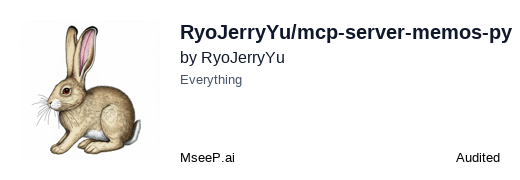About
A Python MCP server that lets LLM models search, create, retrieve, and manage memos in a Memos instance using access tokens for secure authentication.
Capabilities

Overview
The MCP Server Memos package equips large language models with seamless access to a self‑hosted Memos instance via the Model Context Protocol (MCP). By exposing a set of intuitive tools—search, create, retrieve, and tag management—this server eliminates the friction that normally accompanies manual data retrieval or custom API integrations. Developers can now prompt an AI assistant to read, write, and organize memos directly from the conversational interface, turning static notes into a dynamic knowledge base that evolves in real time.
Problem Solved
In many teams, information is scattered across spreadsheets, chat logs, or ad‑hoc note apps. Retrieving a specific memo often requires manual navigation through a web UI or writing bespoke queries. The MCP Server Memos bridges this gap by presenting the memo repository as a first‑class resource in an AI workflow. It provides authenticated, fine‑grained access to memo content and metadata without exposing raw HTTP endpoints or requiring developers to write custom wrappers.
Core Value for AI‑Driven Development
- Contextual Retrieval: An assistant can fetch relevant memos on demand, enabling richer explanations or code snippets that reference internal documentation.
- Dynamic Knowledge Expansion: New memos can be created from within a conversation, allowing the knowledge base to grow organically as the project evolves.
- Tag‑Based Organization: Tools for listing and filtering tags let AI agents recommend or categorize information, improving discoverability.
Key Features & Capabilities
| Feature | What It Does |
|---|---|
| Search memos | Query memo content using keywords, returning concise matches. |
| Create memo | Programmatically add new entries with configurable visibility (PUBLIC, PROTECTED, PRIVATE). |
| Retrieve memo by ID | Fetch the full text of a specific memo using its unique identifier. |
| Tag management | List all tags for a given owner and filter by visibility, aiding structured navigation. |
| Secure authentication | Uses access tokens to authenticate against the Memos server, ensuring that only authorized agents interact with sensitive data. |
These tools are exposed through the MCP interface, meaning any LLM client that understands MCP can invoke them with a simple prompt or tool call. The server runs as an HTTP service on a configurable host and port, making it trivial to integrate into existing microservice architectures or local development stacks.
Real‑World Use Cases
- Documentation Bots: An AI assistant that can pull up the latest design doc or code review memo when a developer asks for context during a pair‑programming session.
- Knowledge Base Maintenance: Automatically generate summary memos from meeting transcripts, then let the assistant retrieve or update them as needed.
- Compliance Audits: Search for policy memos that mention specific keywords or retrieve tags to ensure all relevant documentation is up to date.
- Onboarding: New team members can query memos for project history, sprint notes, or architecture diagrams directly through chat.
Integration with AI Workflows
Because the server follows MCP conventions, it can be declared in a client’s configuration alongside other tool servers. Once registered, the assistant can invoke any of the memo tools as if they were native capabilities—no custom API calls required. The server’s authentication token is passed once during setup, and all subsequent tool calls automatically include the necessary headers. This tight coupling lets developers focus on crafting prompts and business logic rather than plumbing.
Standout Advantages
- Zero‑Code Integration: No need to write HTTP clients or handle JSON parsing; the MCP abstraction handles it all.
- Lightweight & Self‑Hosted: Leverages the open‑source Memos platform, keeping data on-premises while still exposing it to AI agents.
- Fine‑Grained Access Control: Visibility settings and tag scopes provide the same security model developers already use within Memos, preserving existing workflows.
- Extensibility: The tool list can be expanded by adding new endpoints to Memos or custom logic, all while staying within the MCP contract.
In summary, the MCP Server Memos turns a simple note‑taking application into a rich, AI‑driven knowledge source. By bridging conversational agents with structured memo data through a standardized protocol, it empowers developers to build smarter assistants that can read, write, and organize information on the fly.
Related Servers
n8n
Self‑hosted, code‑first workflow automation platform
FastMCP
TypeScript framework for rapid MCP server development
Activepieces
Open-source AI automation platform for building and deploying extensible workflows
MaxKB
Enterprise‑grade AI agent platform with RAG and workflow orchestration.
Filestash
Web‑based file manager for any storage backend
MCP for Beginners
Learn Model Context Protocol with hands‑on examples
Weekly Views
Server Health
Information
Tags
Explore More Servers
Confluence MCP Server
Integrate Confluence Cloud with AI tools in Spring Boot
Jolokia MCP Server
Control Java apps via LLMs using JMX over HTTP
MCP Project Server
Intelligent assistant server for multi‑LLM and tool integration
Swift MCP GUI Server
Control macOS via SwiftAutoGUI with MCP
IMAP MCP Server
Expose IMAP email operations as AI tools
HAP MCP Server
Seamless AI integration for enterprise apps via HAP API tools